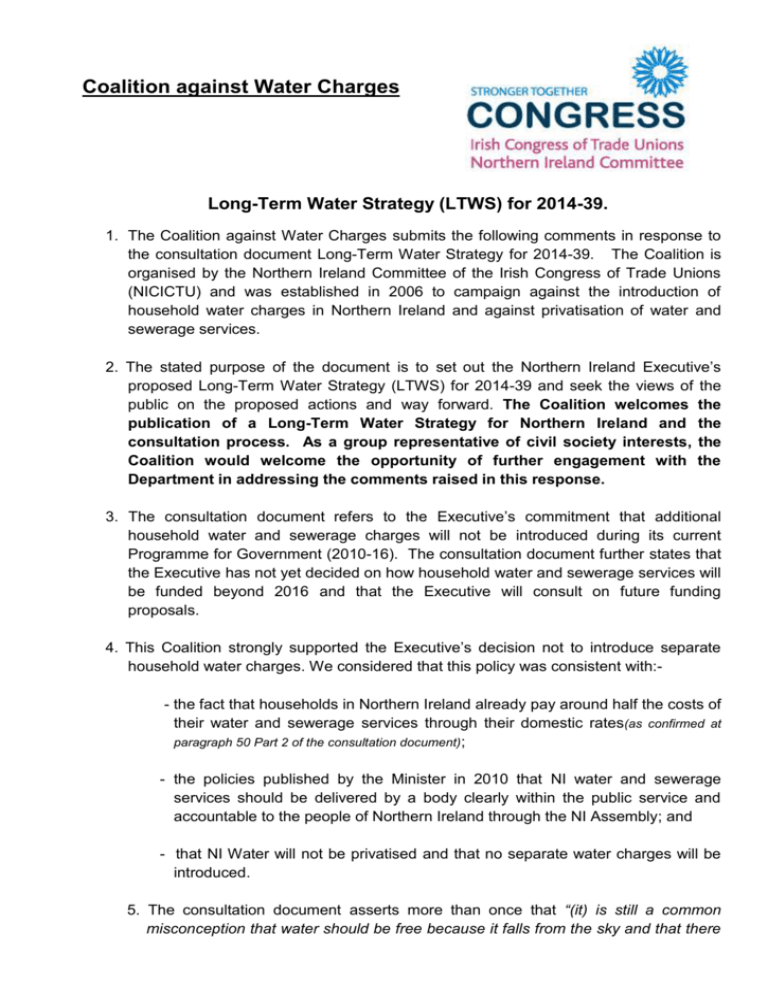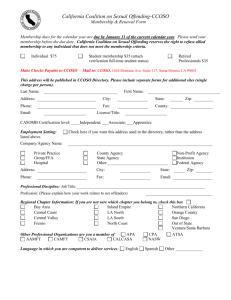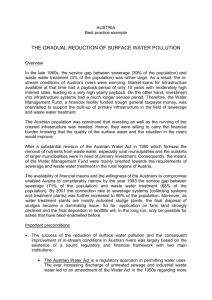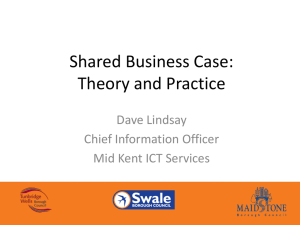now - Irish Congress of Trade Unions
advertisement

Coalition against Water Charges Long-Term Water Strategy (LTWS) for 2014-39. 1. The Coalition against Water Charges submits the following comments in response to the consultation document Long-Term Water Strategy for 2014-39. The Coalition is organised by the Northern Ireland Committee of the Irish Congress of Trade Unions (NICICTU) and was established in 2006 to campaign against the introduction of household water charges in Northern Ireland and against privatisation of water and sewerage services. 2. The stated purpose of the document is to set out the Northern Ireland Executive’s proposed Long-Term Water Strategy (LTWS) for 2014-39 and seek the views of the public on the proposed actions and way forward. The Coalition welcomes the publication of a Long-Term Water Strategy for Northern Ireland and the consultation process. As a group representative of civil society interests, the Coalition would welcome the opportunity of further engagement with the Department in addressing the comments raised in this response. 3. The consultation document refers to the Executive’s commitment that additional household water and sewerage charges will not be introduced during its current Programme for Government (2010-16). The consultation document further states that the Executive has not yet decided on how household water and sewerage services will be funded beyond 2016 and that the Executive will consult on future funding proposals. 4. This Coalition strongly supported the Executive’s decision not to introduce separate household water charges. We considered that this policy was consistent with:- the fact that households in Northern Ireland already pay around half the costs of their water and sewerage services through their domestic rates(as confirmed at paragraph 50 Part 2 of the consultation document); - the policies published by the Minister in 2010 that NI water and sewerage services should be delivered by a body clearly within the public service and accountable to the people of Northern Ireland through the NI Assembly; and - that NI Water will not be privatised and that no separate water charges will be introduced. 5. The consultation document asserts more than once that “(it) is still a common misconception that water should be free because it falls from the sky and that there is no need to conserve water because we have so much rain.” The Coalition disputes the accuracy of this assertion – the people of Northern Ireland are well aware of the costs of delivering water and sewerage services because they already contribute to these costs through their domestic rates. 6. The Coalition reiterates its support for householders’ contribution to the future funding of NI Water to continue to be based on the current arrangements. The Coalition further calls for the Executive’s consultation on future funding to include detailed examination of the options of restoring the practice of rehypothecation of regional rates to clarify the annual contribution by householders to the costs of water and sewerage services. 7. The consultation document notes that annual operational costs for NI Water for 2012/13 are still nearly 18% higher than an average English company. However, as stated, the facts are that various local factors including NI Water’s large operating area, length of network, smaller customer base and current governance and funding arrangements contribute to this difference in costs. As also stated NI Water has reduced its costs since 2007. The Coalition calls for such costs comparisons to take fully into account all factor differences and to include comparable costs of Scottish and Welsh water and sewerage services. 8. Reference is made to the current regulatory and financial framework for the water industry under the Water and Sewerage Services (Northern Ireland) Order 2006 which established NI Water as a government owned water and sewerage company subject to independent environmental and economic regulation. It is further stated that The Utility Regulator currently costs customers around £1.5m per year to regulate NI Water. 9. We further note that the consultation document refers to the importance of the Regulatory system not overly burdening NI Water and diverting funding and resources from service delivery and asks ( Consultation Question WSS 1):Do you agree with the identified principles of regulation currently applied? Should further consideration be given to best practice in other regulatory sectors? 10. There have been claims previously about the complexity of governance arrangements hampering the ability of NI Water to deliver efficient water and sewerage services. On the contrary however, the evidence presented in the consultation document is that under the current structures, NI Water has been able to improve efficiency and standards significantly. The Coalition therefore submits that the current governance and regulatory arrangements be maintained for the future and the NI Executive ensures that NI Water remains as a public service wholly accountability to the NI Assembly. 11. The consultation document raises the important issue of ensuring water is used efficiently. It is asserted (Part 2 paragraph 49) that “It is recognised that metered water charges are the most effective means of incentivising consumers to conserve and use water efficiently”. In paragraph 50 the document also links the options for the long-term governance and funding of water and sewerage service with the issue of metering. However no empirical research is offered in the consultation document to sustain the assertion. Indeed, on the contrary, there is evidence that some of the most thoroughly metered regions in the world are amongst the most profligate1. This Coalition therefore challenges the assertion that the use of metering is the most effective way of ensuring water is used efficiently. The Coalition further submits that universal metering of households is not justified on economic or environmental grounds. 12. The consultation document goes on to ask (Consultation Question DW 2)- How should households be encouraged to efficiently use drinking water and meet the aims of the Water Framework Directive? - with the options 01. Education & Public Awareness Campaigns; 02. Requiring water savings devices & measures (e.g. water butts, aerated shower heads, etc); 03. Introducing metered household water charges. This Coalition submits that the most cost effective way to encourage efficient use of water is through investment in a combination of options 01 and 02 only and Option3 should not be pursued. 13. It is significant that NI Water is our largest single consumer of electricity with an annual power bill exceeding £30m with predicted increases in energy prices increasing this bill to around £50m by 2020. (Part 2 paragraph 58). The Coalition supports the proposed measures to improve energy efficiency across the water and sewerage system. However the Coalition believes that the greatest priority (along with appropriate capital investment) should be given to developing renewable energy generation using the assets and lands of NI Water. October 2014 1 TITLE: Do Water Meters Reduce Domestic Consumption?: a summary of available literature AUTHOR: Dr. Chad Staddon. www.heednet.org/metering-defraheednet.pdf







